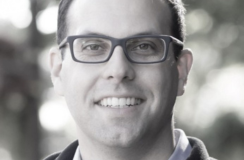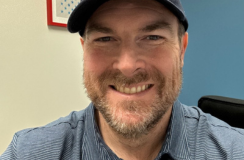rom a young age, Alex Glasner knew he wanted to be an entrepreneur and run a successful company. But like many other aspiring business owners, he didn’t have a clear idea of how to get started.
A few years after attending Harvard Business School, Alex came across the book “HBR Guide to Buying a Small Business” by Harvard professors Richard S. Ruback and Royce Yudkoff. It went into detail about the process of buying a small business. After reading it cover to cover, Alex knew he wanted to put it into action. And by now, he had an idea of where to focus.
While working as a speechwriter for a Member of Parliament in his native U.K., Alex moonlighted as a teacher. These two experiences instilled in him a desire to not just earn money, but to do good in the world, and a profound respect for the power of education to open doors for people. He brought this mission to his search, and found what he was looking for in Workpays, a workforce training provider in the U.K.

Workpays came to Alex’s attention when the founder won an MBE — an award from the Queen — in recognition of the company’s service to young people. It met Alex’s criteria of having a positive social impact, and he felt the industry was set up well for a buy-and-build strategy. He acquired Workpays in fall 2021.
In this episode, Alex explains what it’s like to conduct a search from a different country, why he took six weeks to set up his search structure before making any calls, and why he plans to take his next acquisition slower.
Check out:
✳️ Top takeaways from the episode
✳️ Episode highlights with timestamps
Acquisition Entrepreneur: Alex Glasner
💵 What he acquired: Alex wanted to buy a business that was a positive force in the world, as well as a solid earner. He heard about Workpays, a workforce training provider in the U.K., when the founder won an award. He’d been interested in the workforce training industry, and loved that the company created access to skills and education. He acquired Workpays in fall 2021.
💡 Key quote: “The most important people I spoke to were people who had not been successful [in their search to buy a company]. Understanding why they weren't successful was really influential for my search. There were a couple of themes that I noticed. The most prevalent one was a lot of indecision, so being as decisive as possible was really important.”
👋 Where to find him: LinkedIn
Acquisition Tips From the Episode
Top takeaways from this conversation
✍️ Learn from buyers who have gone before you, especially those who weren’t successful.
Before starting his search, Alex spoke to about 50 people who had gone down the acquisition route themselves, both successfully and unsuccessfully. He learned the most from people who had failed.
His main takeaway was that they were indecisive, waiting for the perfect business to come along.
“The number of people I spoke to who had found companies and there was just one little niggle, and they said to me, I didn't want to buy it because there was something wrong with it,” Alex says.
The second observation he took from his conversations was to have a strong structure set up for running a search. Alex set up his search fund in mid-November 2020, and didn’t make his first call to a company until December 27.
“I spent over six weeks setting up all my materials, setting up how I was going to run the search, coming up with a list of companies, making various presentations … even making a script,” Alex says. “All things I'd been told [to do] previously on the calls.”
💰 Having the government as a primary customer doesn’t necessarily mean you have to worry about customer concentration.
Almost all of Workpays’ income comes from government contracts. Despite this, Alex doesn’t view it as an issue of customer concentration.
The company has three arms to support people through their employment journeys: skills, employability, and apprenticeship. Even though most of Workpays’ business comes from the government, the company works with multiple government departments.
The second reason Alex isn’t concerned is that he’s looking to capitalize on the company’s intellectual property. Workpays creates its own curricula, and Alex believes the company can use its online platform to commercialize these, which will give them another revenue stream away from government contracts.
📖 Be transparent with sellers: Address concerns before they escalate.
Alex was conducting his search from the United States, but was looking for a business in the United Kingdom, where he’s from. He was applying for a Green Card in the U.S., which meant he couldn’t leave the country to meet with sellers in person.
While sellers could have seen this as a red flag, Alex decided to be proactively transparent about his visa issues and location. This approach preempted any potential hesitation on their part that he wasn’t a serious buyer, and his transparency paid off.
Episode Highlights
Inflection points from the show
[1:43] Alex’s father loved running his own business, and Alex wanted to do the same; he just didn’t know where to start.
[4:37] Despite attending Harvard Business School, Alex never took classes taught by the professors who literally wrote the book on buying small businesses.
[5:53] Alex discusses figuring out the financials of doing a search.
[7:26] Alex considered every possible approach to finding a business to acquire, including considering a partnered search or the traditional approach, before settling on self-funding.
[8:52] He spoke to about 50 people with search experience to learn what worked and what didn’t.
[9:34] Why Alex spent the first six weeks ensuring he had a solid structure set up to run his search.
[11:26] Being decisive and not letting perfect become the enemy of the good.
[17:20] Combining all the different methods of running proprietary and brokered searches.
[18:30] The pressure of running a search in the U.K. while waiting for his Green Card application to go through in the U.S.
[21:10] Alex was upfront with sellers that he was in a different country, which mitigated most concerns.
[22:46] Finding Workpays, a company that used education to help people build careers, which met Alex’s criteria of having a social mission.
[31:19] Alex discusses Workpays’ three branches, and what it’s like having the government as the company’s primary client.
[35:02] He expands on how Workpays is able to consistently outperform on its contracts compared to competitors.
[37:25] Despite most of the company’s business coming from the government, Alex doesn’t view it as having heavy customer concentration.
[40:15] Alex talks about his feelings on growing too quickly, and wanting to take the time to better understand the business in his next acquisition.
Links & Mentions
✅ Workpays
✅ HBR Guide to Buying a Small Business: Think Big, Buy Small, Own Your Own Company














%20-%20thumbnail.png)






%20-%20thumbnail.png)



%20-%20thumbnail.png)

.png)




%20-%20thumbnail.png)















%20-%20thumbnail.png)



























































